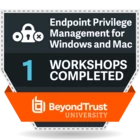Hi @mlajoie - based upon the application group name, I suspect you’ve worked with our Professional Services team on your implementation; so if your project is still open I would suggest working with the engineer who can walk you through this more fully.
However, from what you are describing there are potentially a few areas to explore.
You are using a prompt for a designated user to authorize the user’s action - this message type can be configured to run the application as the authorizing user which if the user account is not a local administrator could cause a native UAC prompt to appear.
Another possibility is that the application rule is not configured to elevate the process, but instead to run it passively - when EPM has applied the assigned rule behavior (e.g., running the application with a Passive token), if the application still requires elevation and it hasn’t been provided by EPM, then UAC will then be triggered.
The other consideration is that Windows Terminal is a modern Windows application type (Universal Windows Platform/UWP), specifically a Centennial application - these are broadly handled by EPM as ‘Windows Store Applications’.
EPM also has specific support for Centennial applications, handling them via Application Rules, even when they are launched via the ‘Run as administrator’ context menu (or custom menu item), which means rule order processing needs to be considered to ensure you are handling the application correctly.
The wt.exe you reference is actual an alias for the Terminal application, rather than being a traditional executable - so if you are hitting configuration which is trapping it, settings like child process inheritance are relevant depending upon what is being matched.
Apologies for the rather vague answer, but hopefully I’ve given you some areas to explore.








